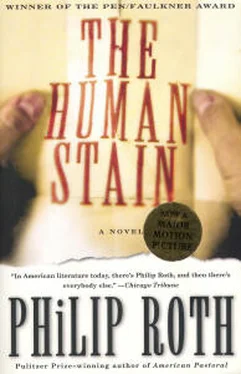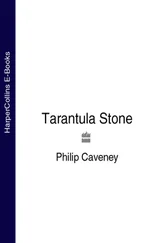Of course, even in East Orange he had not escaped the minimally less malevolent forms of exclusion that socially separated his family and the small colored community from the rest of East Orange — everything that flowed from what his father called the country's “Negrophobia.” And he knew, too, that working for the Pennsylvania Railroad, his father had to put up with insults in the dining car and, union or no union, prejudicial treatment from the company that were far more humbling than anything Coleman would have known as an East Orange kid who was not only as light-skinned as a Negro could get but a bubbling, enthusiastic, quickwitted boy who happened also to be a star athlete and a straight-A student. He would watch his father do everything he could so as not to explode when he came home from work after something had happened on the job about which, if he wanted to keep the job, he could do nothing but meekly say, “Yes, suh.” That Negroes who were lighter were treated better didn't always hold true. “Any time a white deals with you,” his father would tell the family, “no matter how well intentioned he may be, there is the presumption of intellectual inferiority. Somehow or other, if not directly by his words then by his facial expression, by his tone of voice, by his impatience, even by the opposite — by his forbearance, by his wonderful display of humaneness —he will always talk to you as though you are dumb, and then, if you're not, he will be astonished.” “What happened, Dad?” Coleman would ask. But, as much out of pride as disgust, rarely would his father elucidate. To make the pedagogical point was enough. “What happened,” Coleman's mother would explain, “is beneath your father even to repeat.”
At East Orange High, there were teachers from whom Coleman sensed an unevenness of acceptance, an unevenness of endorsement compared to what they lavished on the smart white kids, but never to the degree that the unevenness was able to block his aims. No matter what the slight or the obstacle, he took it the way he took the low hurdles. If only to feign impregnability, he shrugged things off that Walter, say, could not and would not. Walt played varsity football, got good grades, as a Negro was no less anomalous in his skin color than Coleman, and yet he was always a little angrier about everything. When, for instance, he didn't get invited into a white kid's house but was made to wait outside, when he wasn't asked to the birthday party of a white teammate whom he'd been foolish enough to consider a buddy, Coleman, who shared a bedroom with him, would hear about it for months. When Walt didn't get his A in trigonometry, he went right to the teacher and stood there and, to the man's white face, said, “I think you made a mistake.” When the teacher went over his grade book and looked again at Walt's test scores, he came back to Walt and, even while allowing his mistake, had the nerve to say, “I couldn't believe your grades were as high as they were,” and only after a remark like that made the change from a B to an A. Coleman wouldn't have dreamed of asking a teacher to change a grade, but then he'd never had to. Maybe because he didn't have Walt's brand of bristling defiance, or maybe because he was lucky, or maybe because he was smarter and excelling academically wasn't the same effort for him that it was for Walt, he got the A in the first place. And when, in the seventh grade, he didn't get invited to some white friend's birthday party (and this was somebody who lived just down the block in the corner apartment house, the little white son of the building's super who'd been walking back and forth to school with Coleman since they'd started kindergarten), Coleman didn't take it as rejection by white people — after his initial mystification, he took it as rejection by Dicky Watkin's stupid mother and father. When he taught Doc Chizner's class, he knew there were kids who were repelled by him, who didn't like to be touched by him or to come in contact with his sweat, there was occasionally a kid who dropped out — again, probably because of parents who didn't want him taking boxing instruction, or any instruction, from a colored boy — and yet, unlike Walt, on whom no slight failed to register, Coleman, in the end, could forget it, dismiss it, or decide to appear to. There was the time one of the white runners on the track team was injured seriously in a car crash and guys from the team rushed to offer blood to the family for the transfusions, and Coleman was one of them, yet his was the blood the family didn't take. They thanked him and told him that they had enough, but he knew what the real reason was. No, it wasn't that he didn't know what was going on. He was too smart not to know. He competed against plenty of white Newark guys at track meets, Italians from Barringer, Poles from East Side, Irish from Central, Jews from Weequahic. He saw, he heard — he overheard. Coleman knew what was going on. But he also knew what wasn't going on, at the center of his life anyway. The protection of his parents, the protection provided by Walt as his older, six-foot-two-and-a-half-inch brother, his own innate confidence, his bright charm, his running prowess (“the fastest kid in the Oranges”), even his color, which made of him someone that people sometimes couldn't quite figure out — all this combined to mute for Coleman the insults that Walter found intolerable. Then there was the difference of personality: Walt was Walt, vigorously Walt, and Coleman was vigorously not. There was probably no better explanation than that for their different responses.
But “nigger” — directed at him? That infuriated him. And yet, unless he wanted to get in serious trouble, there was nothing he could do about it except to keep walking out of the store. This wasn't the amateur boxing card at the Knights of Pythias. This was Woolworth's in Washington, D.C. His fists were useless, his footwork was useless, so was his rage. Forget Walter. How could his father have taken this shit? In one form or another taken shit like this in that dining car every single day! Never before, for all his precocious cleverness, had Coleman realized how protected his life had been, nor had he gauged his father's fortitude or realized the powerful force that man was — powerful not merely by virtue of being his father. At last he saw all that his father had been condemned to accept. He saw all his father's defenselessness, too, where before he had been a naive enough youngster to imagine, from the lordly, austere, sometimes insufferable way Mr. Silk conducted himself, that there was nothing vulnerable there. But because somebody, belatedly, had got around to calling Coleman a nigger to his face, he finally recognized the enormous barrier against the great American menace that his father had been for him.
But that didn't make life better at Howard. Especially when he began to think that there was something of the nigger about him even to the kids in his dorm who had all sorts of new clothes and money in their pockets and in the summertime didn't hang around the hot streets at home but went to “camp”—and not Boy Scout camp out in the Jersey sticks but fancy places where they rode horses and played tennis and acted in plays. What the hell was a “cotillion”? Where was Highland Beach? What were these kids talking about? He was among the very lightest of the light-skinned in the freshman class, lighter even than his tea-colored roommate, but he could have been the blackest, most benighted field hand for all they knew that he didn't. He hated Howard from the day he arrived, within the week hated Washington, and so in early October, when his father dropped dead serving dinner on the Pennsylvania Railroad dining car that was pulling out of 30th Street Station in Philadelphia for Wilmington, and Coleman went home for the funeral, he told his mother he was finished with that college. She pleaded with him to give it a second chance, assured him that there had to be boys from something like his own modest background, scholarship boys like him, to mix with and befriend, but nothing his mother said, however true, could change his mind. Only two people were able to get Coleman to change his mind once he'd made it up, his father and Walt, and even they had to all but break his will to do it. But Walt was in Italy with the U.S. Army, and the father whom Coleman had to placate by doing as he was told was no longer around to sonorously dictate anything.
Читать дальше












